Author Bryan Mealer is used to covering hardships. His books include All Things Must Fight Life, a report on war in the Democratic Republic of Congo and The Boy Who Harnessed the Wind, his story on famine in Malawi co-authored by Malawian inventor William Kamkwamba. In his latest endeavor, Mealer studied poverty not in a foreign nation, but rather in South Florida. Mealer's Muck City: Winning and Losing in Football's Forgotten Town follows the 2010 season of the national powerhouse Glades Central Raiders, as they battle for a state championship. The high school, located in Belle Glade, Fla., has sent about 30 players to the NFL, including Santonio Holmes and Fred Taylor. Despite the athletic success, Belle Glade is also among the most impoverished, crime-filled and academically underachieving cities in the nation. Mealer uses football as a guide to tell the story of one of the United States' most misunderstood cities.
ThePostGame: How did the idea to cover the Glades Central football team originate?
BRYAN MEALER: I heard about them just reading about football. After Santonio Holmes made that game winning catch in the Super Bowl, they were talking about where he's from. In ESPN the Magazine, they did this story about these guys chasing rabbits. That's the most famous story in Belle Glade. Belle Glade is situated right in the sugar cane fields in the Everglades. Each year, even to this day, before they harvest that sugar cane, the farmers light the fields on fire. It burns out undergrowth and chases out gators and wild pigs and rabbits–thousands and thousands of rabbits. These kids who've lived in Belle Glade and Pahokee and these small towns, for generations, they wait in the cane breaks and when the farmers light these fires, it pushes the rabbits out. When they hit those cane breaks, the guys chase them down and kill them. The legend is, that's what makes them so fast. I heard that story and it was just fascinating.
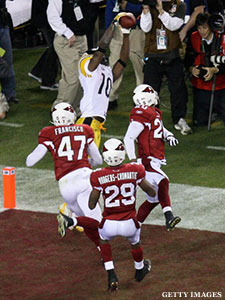
When I finished some of my work in Africa, I went into Belle Glade and was just kind of poking around to see if anyone had written a book and they hadn't, so I went there and met Jessie Hester, the coach, and I went from there. The first time I went to Belle Glade, I was just absolutely stunned because I knew that it had football, I knew it was a poor town and kind of ravaged by the sugar industry over the years and what I saw when I went into Belle Glade was some of the most poverty that I had ever seen in this country. It was similar to places that I'd been reporting and writing about like Uganda, Kenya and Congo. To have that just 40 miles from Palm Beach was stunning to me. It really brought it home and it made me fascinated with that place.
TPG: How did your experience covering an American high football team compare to some of your other experiences such as covering war in the Democratic Republic of Congo and famine in Malawi?
MEALER: I'd never covered football. I'd never covered sports at all. I covered mostly conflict and I've covered poverty in Africa with William Kamkwamba, so most of my reporting had been poverty-related, so I came into Belle Glade just with that perspective and that in mind. I was going to go in and I was going to write a book about modern American poverty and industry. I walked away with a great football story. I didn’t know I'd get that. I kind of focused on football to use that as a door in and a door out, not knowing I would get this kind of thrilling ride through a season where these guys would go to the state championship. It turned out to be the greatest narrative in the town. It was a great vehicle that I was able to use to write about the sugar industry, to write about the AIDS and to write about the migrant history. I used Jessie Hester, the coach, who had been a migrant himself, so him and some of the older guys I focused on were this kind of natural bridge to that world and it worked out great.
TPG: Muck City has been compared to H.G. Bissinger's 1990 novel "Friday Night Lights: A Town, a Team and a Dream." What kind of changes did you witness in high school football more than 20 years after his book?
MEALER: It's funny because I was born in Odessa, where that book takes place. I was raised in West Texas, so that book has always been really special to me. It deals with the oil collapse in the 80s that affected my family. I think Bissinger and I are similar in that we follow a team and we write a larger story about a town, but I think that's where the likenesses stops. The ugly racism Bissinger found in that book is what made it what it is. It really catapulted that book beyond the genre. Belle Glade is not like any other city in this country. It's not like any other town in this country. In Belle Glade, you're in a situation where you're at the poorest high school in Florida and a lot of these kids live in this migrant ghetto where a lot of these houses just have shared toilets and shared bathrooms.
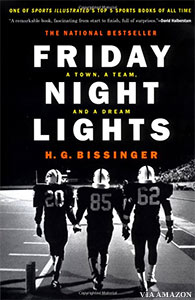
There was a girl when I was there that walked into the principal's office and said she couldn't take a shower because she was afraid of being raped by the men that would wait outside her door. It's a place where kids are found living in boarded up houses where they eat sardines. We don't really see this. These things should not be familiar to Americans. They didn't experience that stuff in Odessa. That's where we're different. It is the same in we chose football as the best way to tell the story of the town.
TPG: How would you describe the importance of football to the people of Belle Glade?
MEALER: It's kind of a cliché, but it's true these guys are really playing for their lives. You have a town where the unemployment rate is bad because the sugar industry bought up a lot of the vegetable land, and they can only employ so many people. Belle Glade was once called the "Winter Vegetable Capital of the World." There's a lot of history there with migrant labor, and they base the sugar industry off all this land they bought up, and of the course of the years, they began to exclude the local population. Now, you have a situation where there's about a 40 percent unemployment rate and there's only about two or so places you can actually have a career. Two of them happen to be prisons that closed last year. There's a 40 percent unemployment rate and the crime is outrageous. You have situations where half the young men between ages 18 and 25 have felony convictions that keep them from being gainfully employed. There's really not a future for young men and women there. Being the poorest high school in the state of Florida, it's also been a perennial underperformer. Before I got there, the high school hadn't even scored anything on the state's report card above a D. You have poor academics, poor job opportunities, so playing football is a golden parachute for these kids, so you grow up in the Glades to be a Glades Central Raider. If you don't sort of hit that window, then god help you because after that, the current is pretty strong against you once you have to circle back into the world.
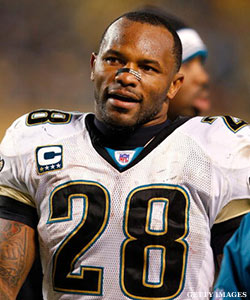
TPG: About 30 Belle Glade Raiders have played in the NFL. What did their accomplishments mean to the Belle Glade community?
MEALER: It's what made the city famous. You had Jessie Hester, who's kind of the central character in my book, who was the first guy to go in the first round. That really put the spotlight on the town. The floodgates began to open after him. Some 30 guys have gone since him, including Santonio Holmes and Fred Taylor (pictured at left). Pahokee, which is eight miles away, you've got Anquan Boldin and Andre Waters, the defensive player for the Eagles in the 80s and 90s. Those guys are what made this place famous, but it's also a conflicted relationship the town has with them because many of them don't come back because it's so poor, because it's so violent. It was so rough even when they were growing up. It's even more unrecognizable now to them.
Santonio Holmes comes back maybe once a year to do a charity football event with his cousin Fred Taylor, but it's not the town that he was raised in. They'll come back and they give money where they can. They'll help with buying cleats for the football team, but there's really nothing there for them. That's what made it so important when Jessie Hester decided to come back and be the coach of the Raiders. He was lionized in the town. He was a great hero for doing that. As you read in the book, all that kind of changed because in the end, winning is everything or nothing at all.
TPG: Coach Hester's story is very interesting as he went from NFL player to coach of the football team in an impoverished town. What kind of person was he to work with?
MEALER: Hester is a guy that's had a lot of fame. He was an incredibly guarded and private person. He had stayed out of the game and been retired 12 years when the school came and offered him the job. He reluctantly took it only because he had been driving around his hometown a couple weeks earlier and saw two kids doing what he thought was selling drugs on the street corner, and he recognized those two boys as teammates of his son, Jessie Jr., who had also played for the Raiders. These kids had sat at his kitchen table and eaten his food, and he thought man, you know, I could have helped them if I was coach. He made that decision to come back. He's not a celebrity at all. He's very focused on his guys. What he said was "win kids, not championships."
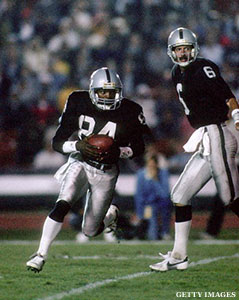
The first year that he came back was in 2008 and he was quickly put to the test. He found out that half his team was involved in gangs to the point they would not block for each other and they would fight each other after practice. Two of those kids later that year got shot. By the time I got there, he had been purging this negative element from the team and putting up these walls around the team to block the outside dark forces. I was seeing the final product of that. He was tough. He was very focused on these guys. In terms of being a former pro, you never really heard it from him, but through the course of this book, I spoke to a lot of former NFL players, and he was the only one who was dedicated to that place.
TPG: How open was the football team and the Belle Glade community to your presence?
MEALER: It was really tough for me at first. Hester agreed to let me follow the team in July during the two-a-days and stuff like that when they started and I moved into a little motel room on Main Street in Belle Glade, and I started following the team. I think that surprised them that I was there everyday. I had to learn the hard way reporters in Belle Glade are not seen very fondly. In the 80s, Belle Glade had the highest rate of AIDS in the country and journalists just wrote all these negative stories. Basically, Belle Glade has been depicted as nothing but negative in the press for decades. I mean the drugs, the gangs, the AIDS, the disease, the poverty. Here I am, I was this white guy from New York in a mostly black town, and so the history was against me. Little by little, I just stayed around and I won by attrition I guess. I like to go running, so in the morning, I would get out of my hotel room and go run around the canals and stuff. People would see me later and say, "Man, I saw you running. Do you stay here? Do you live here?" I was like, "Yeah."
After that, I went on this gospel radio station, Sugar 900, and I introduced myself to the town, told them what I was doing. After that, people kept seeing me around, asking how I was doing and I was getting trust. After a while, people would just come and tell me their stories, but it wasn't until the end of the season I even got an interview with Jessie Hester. He made me wait the entire season. This is my main character, and for about six months, I didn't know if he was ever going to sit down with me for an interview. It wasn't until after the season that I had more than a 30-minute interview with him. I guess he had to see if I was going to be there and stick around. It was a trust thing on my part to, seeing if these guys would open up to me.
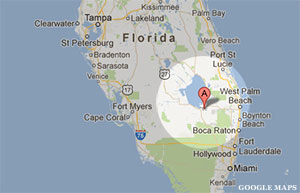
TPG: How did Hester feel about you interviewing his players?
MEALER: He gave me exclusive access to his team. He was very nice about that. Throughout the course of the season, I would wake up, go talk to players' families, go meet them for lunch, just dig into the family histories. I ended up following four players and their families. In the afternoon, I would go to practice. At night, I would empty my notebooks and transcribe all my interviews. And the reporting continued well into the writing of the book. Even after the season finished, I wasn't halfway finished with my reporting, I would go back and back and back. It was a long process, but he gave me tremendous access, as did the principal at Glades Central who gave me access into his classrooms and with his teachers and students.
TPG: What effect will your presence, your reporting and this book leave on Belle Glade?
MEALER: I've heard the book is being received well. One of the best compliments I can get is someone said, "Hey man, you told it like it is." For any journalist, that's high praise. I hope people in the Glades can see it and hear my interpretation. I tried to see beyond the tragedy and the poverty, and see really what it takes to live there and what it takes to get out of there and what it takes succeed. I didn't grow up with a whole lot of opportunity, but I didn't grow up in the Glades. In the Glades, it's tougher than most places for a younger person. You have to be so focused and so dedicated. That world is designed to drag you down. I was humbled and I was really impressed by a lot of these kids who can make it out because it takes some moxy and determination. I hope I captured their struggle and did justice.
TPG: What message do you have for those who have negative preconceived notions of Belle Glade as an impoverished, helpless city?
MEALER: I spent my career in the last couple books I've done writing on places that I feel like people are written off. I spent four years in the Congo writing about people and families trying to make it, trying to regain some kind of dignity in their lives during war. I did that in Malawi during the famine with Willy Kamkwamba, and so I felt like I was just doing that here. Belle Glade had been written off by people, but I knew just like anywhere, there were great stories to be told. There were great struggles that were being undertaken, so I just wanted to go in there and shine the light in that darkness and certainly, there was one.
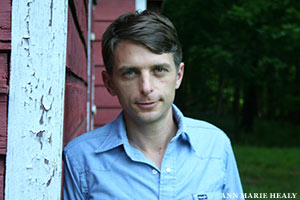
TPG: If you could change one thing about Belle Glade, what would it be?
MEALER (pictured at right): I guess if I could change anything, I would give those people some jobs and give these kids something to sustain themselves, something to get out of there. Right now, that's a place people want to flee. They don't want to stay there. Eventually that town is just going to be nothing because eventually, no one's going to live there. When people have jobs and future, they're not going to join gangs and get into trouble and that kind of stuff. I would ensure opportunity there. It's a place with an incredible amount of pride because it's so tough. It's like no other place in the world. I love that place. I'm actually going to be in Belle Glade Saturday to do a reading there at the First Baptist Church and I'm excited. I love going there. People are really nice and warm, and it was a great place to come from, but people can't stay there.
TPG: The Muck Bowl between the Raiders and the Pahokee Blue Devils is one of the most famous high school rivalry games in the nation. Did that game live up to the hype?
MEALER: Unfortunately for me, Pahokee was having an off-year. They've actually had a few off-years because they're building their program. They won consecutive championships earlier in the 2000s, but when I got there, they were rebuilding and the Raiders just stomped them. It was the most lopsided victory in Muck Bowl history with a score of 58-0. The whole build-up and pump-up to the rivalry was there and that was fun. I write in the book for three days, people come from all over the country to these two towns. It's probably obscure from space by all the, smoke that's coming up from the grills, but it's a fun time. It lived up to its hype, but the game kind of sucked.
TPG: What are your thoughts on the role of high school football in the United States? Is it an important part of the culture or are they too overhyped?
MEALER: I can't speak for the other schools. I've only covered one town, one football team, but it's such an altered reality in Belle Glade because high school football is everything. It's really the only ticket to college. Of course there's way too much emphasis put upon it when there should be more emphasis put on education and opening that avenue a little more, but you can't change tradition in this country. High school football will always be there. In places like the Glades, it's going to be more important than anything else. Unfortunately, for a lot of kids, there's really nothing else.
TPG: How will spending one year writing Muck City affect you moving forward?
MEALER: It made me a better reporter. I mean, every book makes you a better reporter and writer. I like writing about towns. I like writing about poverty issues, and I think I'll keep doing that. Now I'm living in Austin, Texas closer to my family. I've got a couple kids now. We were trying to raise a family while I was in Belle Glade and I was gone for so long. I'm looking into a book about my hometown in West Texas, Big Spring, and the big oil collapse in the 80s that affected it.









